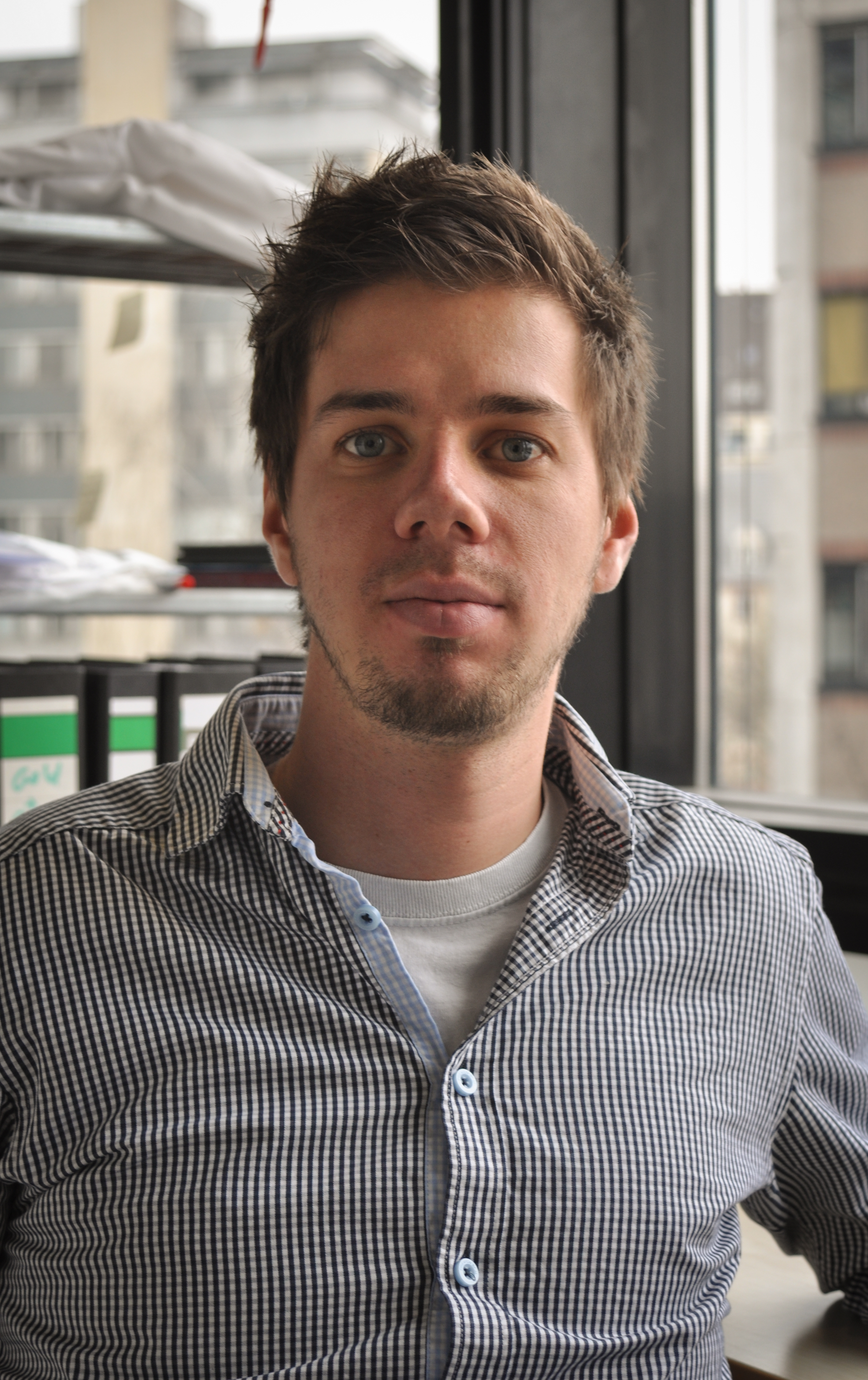Henning Luelf
PhD Student
Office: ISIS 2.05 Telp: +33 368 855 211 FAX: +33 368 855 242 Email: henning@unistra.fr
|
Personal details |
|
|
Name |
Henning Lülf |
|
Date of birth |
23.04.1985 |
|
Birthplace |
Steinfurt, Germany |
|
Nationality |
german |
|
|
henning@unistra.fr |
|
|
|
|
|
|
|
Present status |
|
|
May 2010 - now |
Ph.D. Student in chemistry. University of Strasbourg / (Institut de Science et d'Ingénierie Supramoléculaires (ISIS). Supervisor: Professor Luisa De Cola |
|
|
|
|
Education |
|
|
May 2010 – August 2012 |
Ph.D. at the University of Münster (Westfälische-Wilhelms-Universität Münster) Topic: Zeolith-L Nanocontainer: Synthesis, Properties and Applications. Supervisor: Professor Luisa De Cola |
|
October 2009 – March 2010 |
Master thesis (Diplomarbeit) University of Münster (Westfälische-Wilhelms-Universität Münster) Topic: Luminescent metal complexes. Synthesis and photophysical properties. Supervisor: Professor Luisa De Cola Grade: Sehr gut |
|
October 2005 – October 2009:
|
Studies in chemistry. University of Münster (Westfälische-Wilhelms-Universität Münster) |
|
1996 – June 2005 |
Kardinal-von-Galen Gymnasium, Münster-Hiltrup (Germany) |
|
1992 – 1996 |
Kardinal-von-Galen Grundschule, Drensteinfurt (Germany) |
|
|
|
|
Internships |
|
|
28.04.2009 – 23.07.2009 |
Internship at the BASF in Guaratinguetá (Brazil) Topic: Method development and validation for the analysis of formulations via HPLC-UV/vis and HPLC-MS. |
|
July 2004 |
Internship at Rottendorf Pharma GmbH, Ennigerloh (Germany). |
|
|
|
|
Further education |
|
|
22.11.2012 – 24.11.2012 |
ERC Grantees Conference 2012, Frontier Research in Chemistry, Strasbourg (France) Poster presentation |
|
14.05.2012 – 18.05.2012 |
EMRS 2012 Spring Meeting, Strasbourg (France) Poster presentation |
|
06.10.2010 – 10.10.2010 |
3rd International Summer School “Supramolecular Systems in Chemistry and Biology”, Lviv (Ukraine) Poster presentation |
|
04.07.2010 – 09.07.2010 |
16th International Zeolite Conference joint with the 7th International Mesostructured Materials Symposium (IZC-IMMS 2010), Salerno (Italy) |
|
02.07.2010 – 03.07.2010 |
Summer School of “16th International Zeolite Conference joint with the 7th International Mesostructured Materials Symposium”, Sorrento (Italy) |
|
|
|
|
Skills and experiences |
|
|
Synthesis, characterization and functionalization of nanoparticles (In particular zeolite-L nanoparticles) Expertise: Scanning electron microscopy (SEM), Thermogravimetry (TGA), Differential Scanning Calometry (DSC), Dynamic light scattering (DLS), Zeta-potential measurements.
Organic- and organometallic synthesis und characterization Expertise: Synthesis of organic compounds and metal complexes (in particular platinum(II) complexes) in inert conditions, NMR, mass spectrometry.
Spectroscopy Expertise: IR, UV/vis, Emission, Excitation, Quantum yield, Lifetime…
Chromatography Expertise: HPLC (HPLC-MS), GC
Further expertise and skills In possession of "Eingeschränkte Sachkenntnis nach §5 Abs. 1 Nr 7 der Chemikalienverbotsverordnung vom 14. Oktober 1993" |
|
|
|
|
|
Languages |
|
|
German |
Mother tongue |
|
English |
Business fluent |
|
French |
Basic knowledge A1 |
|
Portuguese (brazilian) |
Basic knowledge |
|
|
|
|
Computer skills |
|
|
Microsoft Office (Word, Excel, Power Point) Materials Studio, Mestre Nova, iNMR, Chem Draw, Chem 3D, Origin, Corel Draw |
|
|
|
|
|
Further experiences |
|
|
March 2008 – April 2009 |
Graduate assistant at the University of Münster Responsibilities: Laboratory and tutorial assistance.
|
|
|
|
|
Publications |
|
|
U. Hahn, H. Luelf, H. D. Winkler, C. A. Schalley, F. Vögtle, L. De Cola; Chem. Eur. J. 2012, 18, 15424-15432.
H. Luelf, A. Devaux, E. Prasetyanto, L. De Cola in Organic Nanomaterials Synthesis, Characterization, and Device Applications, T. Torres, B. Bottari, Wiley 2013.
R.N. Mahato, H. Luelf, M.H. Siekman, S.P. Kersten, P.A. Bobbert, M.P. de Jong, L. De Cola and W.G. van der Wiel, (submitted) |
|
Zeolite-L nanocontainer as key components for functional materials
My research focuses on using zeolite-L nanocontainer (from a few nanometers to a few micrometers in size) as key components for functional materials, mostly for biomedical applications.
Therefore the zeolite crystals are used as materials for imaging or drug delivery, and, when the zeolites are used as substrates, for analyzing and manipulating cells. The final aim is to understand fundamental processes involved in the interaction between cells and nanoparticles and to use this knowledge to trigger processes inside or between cells.
In particular I am using zeolite-L monolayers as a substrate to monitor the growth, multiplication and synaptic communication of nerve cells.
Therefore the conditions to achieve nerve cell growth on a zeolite-L monolayer for at least 9 days have been identified in a first step. In a second step active molecules (e.g. neurotransmitters) will be released by an external trigger (light or electric field) to the nerve cells with a high spatial control.
In addition I am using zeolite-L crystals as key components for applications in nanoelectronic devices based on magnetoresistance effects. We have shown, that zeolite-L crystals filled with high amounts of conductive dye molecules (DXP) show electrical conductivity and, more important, they show an extraordinary high Magnetoresistance of more than 2000% at room temperature, which is the highest obtained so far.

